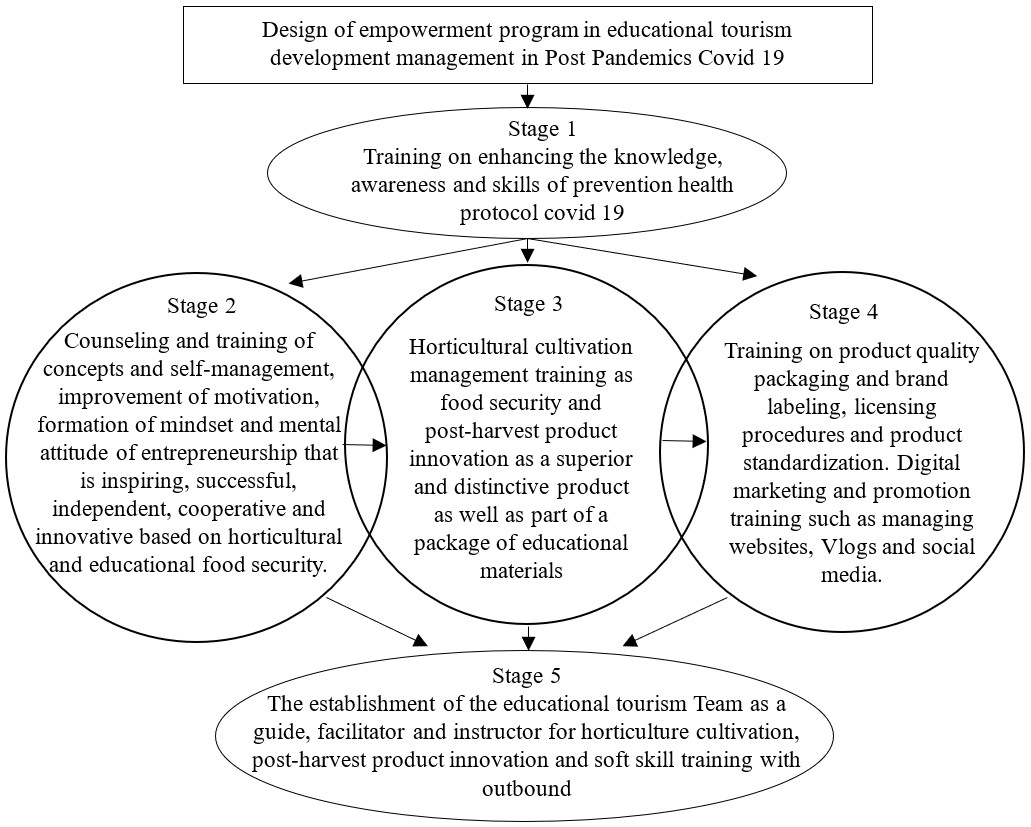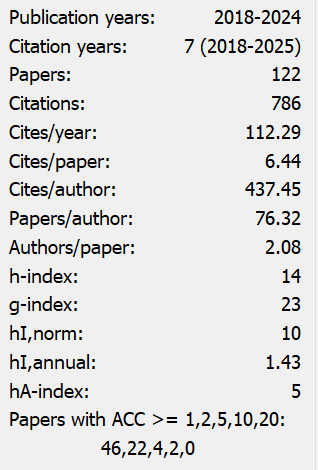Empowerment Program Design in Edutourism Management Post Pandemic Covid 19
Abstract
The agrotourism area not only provides attractions of natural beauty and agricultural products, but also local wisdom that can be used as an educational commodity or educational tourism, so that tourists get knowledge, experience and agricultural cultivation skills from the community or entrepreneurial groups. The Corona Virus 2019 (Covid 19) pandemic in Indonesia resulted in decreasing of tourist visit and income for entrepreneurial groups, so it was important to design an empowerment program in the management of covid 19 post-pandemic tourism development. The research process was carried out before the Covid 19 pandemic: January to mid-March 2020 therefore the researcher could use the Participatory Learning and Action (PLA) method. While data collection was taken by observation, documentation, interviews and discussions with research informants from the village government, tour operators, farmer groups, entrepreneurship groups based on horticultural products, practitioners and experts. And then through a questionnaire from business groups of 60 respondents in tourist locations, it used a survey method and the results are descriptive quantitative data. The research location was in the agro-tourism area of Serang Village, Karangreja District, Purbalingga Regency, Central Java Province. This research used community development analysis, then conducting clarification and data verification using online media due to Covid 19 pandemic. The result of the study was the design of gradual empowerment programs targeting the younger generation such as: (1) the stage of forming and enhancing the mindset, mental attitude and motivation for successful entrepreneurship, teamwork and edu-tourism management; (2) stage of increasing knowledge, awareness and skills, especially innovation in processing horticulture products, packaging, product brand labels and licensing and product standardization; (3) the stages of forming an educational tourism (edutourism) team with the support of stakeholder partnerships to provide edu-tourism management training courses, in terms of administration and financial, information and service teams, creative and entertainment teams, digital media teams, digital marketing and promotion teams.
References
Ahmad, P., Yusof, F., & Abdullah, F. (2013). Local Economic Growth and Community Sustainability. Procedia Social and Behavioral Sciences. 101, 437-444. https://doi.org/10.1016/j.sbspro.2013.07.217
Aikaterini, G., Ioannis, S., & Thanasis, K. (2011). Is Agrotourism ‘Agro’ or ‘Tourism’? Evidence from Agrotourist Holdings in Lesvos, Greece. An International Journal of Tourism and Hospitality Research, 12(1), 6-22. https://doi.org/10.1080/13032917.2001.9686995
Aji, A. A., Satria, A., & Hariono (2014). Strategi Pengembangan Agribisnis Komoditas Padi dalam Meningkatkan Ketahanan Pangan Kabupaten Jember. Journal Manajemen & Agribisnis, 11(1), 60-67. https://doi.org/10.17358/jma.11.1.60-67
Aprina, & Lathifah, N. S. (2016). Pengorganisasian dan Pengembangan Masyarakat. Lampung: Amugrah Utama Raharja.
Daftary, D. (2014). The politics of person, property, technology: emergent development practice in semi-arid communities in India. Community Development Journal, 49(4), 573-588. https://doi.org/10.1093/cdj/bst086
Dale, A., & Newman, L. (2010). Social capital: a necessary and sufficient condition for sustainable community development? Community Development Journal, 45(1), 5-21. https://doi.org/10.1093/cdj/bsn028
Dwiridotjahjono, J., Arifin, A. Z., Sasongko, P. E., Maroeto., & Santoso, W. (2017). Pengembangan Agroekowisata Berbasis Perkebunan Kopi Rakyat di Kecamatan Tutur, Kabupaten Pasuruan. Agrokreatif: Journal Ilmiah Pengabdian kepada Masyarakat. 3(2), 157-165. https://doi.org/10.29244/agrokreatif.3.2.157-165
Evgrafova, L. V., Ismailova, A. Z., & Kalinichev, V. L. (2020). Agrotourism as a factor of sustainable rural development. IOP Conference Series: Earth and Environmental Science, 1-6. https://doi.org/10.1088/1755-1315/421/2/022058
Gitosaputro, S., & Rangga, K. K. (2015). Pengembangan dan Pemberdayaan Masyarakat; Konsep, Teori dan Aplikasinya di Era Otonomi Daerah. Yogyakarta: Graha Ilmu
Getz, D., & Page, S. J. (2016). Progress and prospects for event tourism research. Tourism Management, 52, 593-631. https://doi.org/10.1016/j.tourman.2015.03.007
Gundersena, V., Vistada, O. I., Panzacchib, M., Strandb, O., & van Moorter, B. (2019). Large-scale segregation of tourists and wild reindeer in three Norwegian national parks: Management implications. Tourism Management, 75, 22-33. https://doi.org/10.1016/j.tourman.2019.04.017
Hui Huang, C., Ruey Tsaur, J., & Hai Yang, C. (2012). Does world heritage list really induce more tourists? Evidence from Macau. Tourism Management, 33, 1450-1457. https://doi.org/10.1016/j.tourman.2012.01.014
Indrajit, W., & Soimin (2014). Pemberdayaan Masyarakat dan Pembangunan: Gagasan manajemen Pengembangan Masyarakat untuk Memutus Matarantai Kemiskinan. Malang: Intrans Publishing.
Kalbarini, R. Y., Widiastuti, T., & Berkah, D. (2017). The Comparison Analysis of the Empowerment Productive Zakah Between City and Rural Communities in West Kalimantan Province. Jurnal Ekonomi & Studi Pembangunan, 18(2), 148-154. https://doi.org/10.18196/jesp.18.2.4041
Kaswanto (2015). Land Suitability for Agrotourism Through Agriculture, Tourism, Beautification and Amenity (ATBA) Method. Procedia Environmental Sciences, 24, 35-38. https://doi.org/10.1016/j.proenv.2015.03.006
Kizos, T., & Iosifides, T. (2007). The Contradictions of Agrotourism Development in Greece: Evidence from Three Case Studies. South European Society & Politics, 12(1), 59-77. https://doi.org/10.1080/13608740601155443
Kusuma, D. W., Murwani, D. F., Brawijaya, A. S., & Witjaksono, M. (2017). Development of Agrotourism Through Community Organizing of Tourism Village. European Journal of Economic and Financial Research, 2(2), 113-131. https://doi.org/10.5281/zenodo.81146
Lessy, Z. (2013). Pengorganisasian Masyarakat untuk Perubahan Sosial. Yogyakarta: Graha Ilmu.
Mafruhah, I., Mulyani, N. S., Istiqomah, N., & Ismoyowati, D. (2018). Development of Ecotourism Based on Community Empowerment (A Case Study of Kebumen Regency). Jurnal Ekonomi Pembangunan: Kajian Masalah Ekonomi dan Pembangunan, 19(2), 196-206. https://doi.org/10.23917/jep.v19i2.6996
Mardikanto, T., & Soebiato, P. (2012). Pemberdayaan Masyarakat dalam Perspektif Kebijakan Publik. Bandung: Alfabeta.
Marwanti, S. (2015). Pengembangan Agrowisata Berbasis Masyarakat di Kabupaten Karanganyar. Caraka Tani: Journal of Sustainable Agriculture, 30(2), 48-55. https://doi.org/10.20961/carakatani.v30i2.11886
Matthews, P. (2016). Social media, community development and social capital. Community Development Journal, 51(3), 419-435. https://doi.org/10.1093/cdj/bsv040
Mbah, M. (2014). Towards a model of university-aided technologically driven community development. Community Development Journal, 50(3), 463-477. https://doi.org/10.1093/cdj/bsu056
Merdana, I. M., & dan Wartiniasih, N. L. (2019). Pemberdayaan Masyarakat dan Pengembangan Potensi Kearifan Lokal Berbasis Teknologi Tepat Guna di Desa Kesiut Kecamatan Kerambitan Kabupaten Tabanan. Buletin Udayana Mengabdi, 18(2), 122-127. https://doi.org/10.24843/BUM.2019.v18.i02.p21
Muslim, A. (2016). Economic Community Empowerment Through Tourist Village Development. Mimbar, 32(2), 343-352. https://doi.org/10.29313/mimbar.v32i2.1839
Nicula, V., & Spanu, S. (2014). Ways of Promoting Cultural Ecotourism for Local Communities in Sibiu Area. Procedia Economics and Finance, 16, 474-479. https://doi.org/10.1016/S2212-5671(14)00827-2
Nursalam (2010). Implementasi Kebijakan Peningkatan Produksi Tanaman Pangan Lokal dan Ketahanan Pangan di Provinsi Nusa Tenggara Timur. Jurnal Administrasi Publik, 1(1), 66-77. https://doi.org/10.26858/jiap.v1i1.133
Paul, K. C., Hamzah, A., Samah, B. A., Ismail, I. A., & D’Silva, J. L. (2014) .Value of Social Network for Development of Rural Malay Herbal Entrepreneurship in Malaysia. Procedia - Social and Behavioral Sciences, 130, 59-64. https://doi.org/10.1016/j.sbspro.2014.04.008
Pretty, J. N., Guijt, I. M., Scoones, I., & Thompson, J. (2002). Trainer’s Guide for Participatory Leaning and Action. London: International Institute for Environment and Development (IIED).
Rahmawati, D. E., & Astuti, D. W. (2019). NGO and Community Empowerment Based on Local Wisdom (a Case Study of Spedagi NGO in Temanggung, Central Java, 2018-2019). Journal of Governance And Public Policy, 6(3), 293-306. https://doi.org/10.18196/63114
Ram, Y., Bjork, P., & Weidenfeld, A. (2016). Authenticity and place attachment of major visitor attractions. Tourism Management, 52, 110-122. https://doi.org/10.1016/j.tourman.2015.06.010
Santoso, D. K., & Wikantiyoso, R. (2018). Pengembangan Agrowisata Apel Berbasis Kearifan Lokal Di Poncokusumo. Local Wisdom Scientific Online Journal, 10(1), 1-8. https://doi.org/10.26905/lw.v10i1.2396
Satrio, G., Suwarso., Ahmad, F., & Rohman, S. (2020). Pemberdayaan Masyarakat Melalui Pengembangan Agrowisata Berkonsep Green Marketing (Organik) di Kecamatan Licin. Jurnal Bisnis Terapan, 4(1), 57-68. https://doi.org/10.24123/jbt.v4i1.2483
Scheyvens, R. (1999). Ecotourism and the empowerment of local communities. Tourism Management, 20(2), 245-249. https://doi.org/10.1016/S0261-5177(98)00069-7
Sianipar, C. P. M., Yudoko, G., Adhiutama, A., & Dowaki, K. (2013). Community Empowerment through Appropriate Technology: Sustaining the Sustainable Development. Procedia Environmental Sciences, 17, 1007-1016. https://doi.org/10.1016/j.proenv.2013.02.120
Songkhla, T. N., & Somboonsuke, B. (2012). Impact of Agro-Tourism on Local Agricultural Occupation: A Case Study of Chang Klang District, Southern Thailand. ASEAN Journal on Hospitality and Tourism, 11(2), 98-109. http://dx.doi.org/10.5614%2Fajht.2012.11.2.03
Srithong, S., Suthitakon, N., & Karnjanakit, S. (2019). Participatory Community-based Agrotourism: A Case Study of Bangplakod Community, Nakhonnayok Province, Thailand. International Journal of Interdisciplinary Research, 8(1), 212-220. https://doi.org/10.2139/ssrn.3398859
Stone, M. T. (2015). Community Empowerment Through Community-Based Tourism: The Case of Chobe Enclave Conservation Trust in Botswana. Institutional Arrangements for Conservation, Development and Tourism in Eastern and Southern Africa: A Dynamic Perspective: 81-100, https://doi.10.1007/978-94-017-9529-6_5
Sugito, T., Sulaiman, A. I., Sabiq, A., Faozanudin, M., & Kuncoro, B. (2019). The Empowerment as Community Learning Based on Ecotourism of Coastal Border at West Kalimantan. International Educational Research, 2(3), 23-36. https://doi.org/10.30560/ier.v2n3p23
Sulaiman, A. I., Sugito, T., & Sabiq, A. (2016). Komunikasi Pembangunan Partisipatif untuk Pemberdayaan Buruh Migran. Jurnal Ilmu Komunikasi, 13(2), 233-252. https://doi.org/10.24002/jik.v13i2.734
Sulaiman, A. I., Kuncoro, B., Sulistyoningsih, E. D., Nuraeni, H., & Djawahir, F. S. (2017). Pengembangan Agrowisata Berbasis Ketahanan Pangan Melalui Strategi Komunikasi Pemasaran di Desa Serang Purbalingga. The Messenger, 9(1), 9-25. http://dx.doi.org/10.26623/themessenger.v9i1.423
Susanti, S., & Zulaihati, S. (2017). Penyuluhan Gizi dan Pemberdayaan Ekonomi Perempuan Kelurahan Sindang Barang Bogor. Jurnal Pemberdayaan Masyarakat Madani (JPMM), 1(1), 73-85. https://doi.org/10.21009/JPMM.001.1.06
Suswanto, B., Windiasih, R., Sulaiman., A. I., & Weningsih, S. (2019). Peran Pendamping Desa Dalam Model Pemberdayaan Masyarakat Berkelanjutan. Jurnal Sosial Soedirman, 2(2), 40-60. https://doi.org/10.20884/juss.v2i2.1528


This work is licensed under a Creative Commons Attribution 4.0 International License.
Copyright for this article is retained by the author(s), with first publication rights granted to the journal.
This is an open-access article distributed under the terms and conditions of the Creative Commons Attribution license (http://creativecommons.org/licenses/by/4.0/).


























